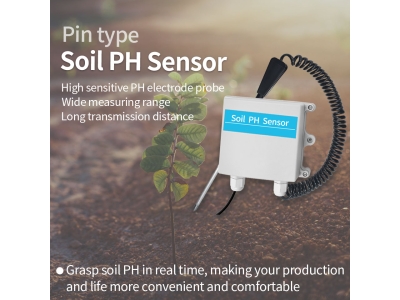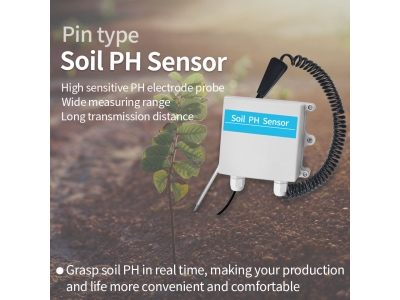In the realm of agriculture, ensuring optimal soil conditions is crucial for enhancing crop productivity. The ability to monitor and manage soil conditions effectively can significantly impact the yield and quality of crops. In recent years, advancements in technology have led to the development of soil sensors, which play a pivotal role in providing real-time data and insights into soil health. This article aims to explore the impact of soil sensors on agriculture and how they contribute to ensuring optimal soil conditions for enhanced crop productivity.

Understanding Soil Sensors
Soil sensors are innovative devices designed to measure various parameters of soil, including moisture content, temperature, pH levels, and nutrient levels. These sensors are equipped with advanced technologies such as electromagnetic induction, capacitance, and optical sensing to accurately assess soil properties. By collecting data on these crucial parameters, soil sensors enable farmers and agricultural professionals to make informed decisions regarding irrigation, fertilization, and overall soil management.
he Impact of Soil Sensors on Crop Productivity
The integration of soil sensors into agricultural practices has revolutionized the way farmers approach soil management. By providing real-time and continuous data on soil conditions, these sensors empower farmers to optimize their irrigation strategies. Over-irrigation can lead to waterlogging and leaching of nutrients, while under-irrigation can result in drought stress and reduced crop yields. Soil sensors help farmers precisely determine the moisture levels in the soil, allowing for more efficient and targeted irrigation, thereby conserving water resources and promoting healthy plant growth.
Furthermore, soil sensors contribute to the implementation of precision agriculture, a farming approach that utilizes technology to tailor agronomic practices to specific areas within a field. By accurately measuring soil properties such as pH and nutrient levels, soil sensors enable farmers to apply fertilizers and soil amendments in a precise and targeted manner. This not only maximizes the effectiveness of inputs but also minimizes environmental impact by reducing the risk of nutrient runoff and leaching.
In addition to optimizing irrigation and fertilization, soil sensors aid in monitoring soil temperature, which is critical for determining the appropriate timing for planting and other agronomic activities. By tracking soil temperature trends, farmers can make informed decisions about when to sow seeds, apply pre-emergent herbicides, or implement other management practices, ultimately leading to improved crop establishment and growth.
Challenges and Considerations
While soil sensors offer numerous benefits for enhancing crop productivity, there are certain challenges and considerations associated with their implementation. One of the primary challenges is the need for accurate calibration and maintenance of soil sensors. Calibrating sensors to specific soil types and conditions is essential to ensure the accuracy of the data they provide. Additionally, regular maintenance and sensor recalibration are necessary to prevent drift and ensure reliable performance over time.
Another consideration is the cost associated with acquiring and deploying soil sensors. While the initial investment in soil sensor technology may pose a financial barrier for some farmers, it is important to recognize the long-term benefits and cost savings that result from improved soil management and enhanced crop productivity.
Furthermore, the interpretation of soil sensor data requires a certain level of expertise and understanding of soil science. Farmers and agricultural professionals need to be equipped with the knowledge and skills to effectively analyze and utilize the data provided by soil sensors. Access to training and educational resources is crucial in enabling farmers to harness the full potential of soil sensor technology.
Future Directions and Conclusion
As technology continues to advance, the capabilities of soil sensors are expected to evolve, offering even greater precision and functionality. The integration of soil sensor data with other technologies, such as automated irrigation systems and drone-based monitoring, holds promise for further optimizing soil management practices and crop productivity.
In conclusion, soil sensors play a pivotal role in ensuring optimal soil conditions for enhanced crop productivity. By providing real-time data on soil moisture, temperature, pH, and nutrient levels, soil sensors empower farmers to make informed decisions regarding irrigation, fertilization, and overall soil management. While challenges such as calibration, cost, and data interpretation exist, the potential benefits of soil sensors in agriculture are substantial. As we move forward, continued research, education, and technological advancements will further enhance the impact of soil sensors, ultimately contributing to sustainable and efficient agricultural practices.
In summary, the utilization of soil sensors is a significant advancement in agriculture, and their impact on ensuring optimal soil conditions for enhanced crop productivity cannot be overstated. As we look to the future, the continued integration and advancement of soil sensor technology will play a crucial role in shaping the agricultural landscape and promoting sustainable food production.






